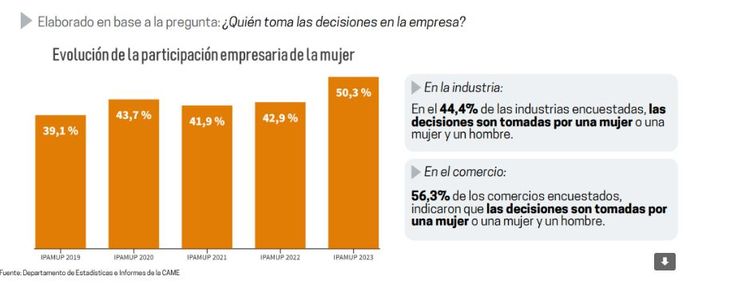In the last year, the participation of women in SMEs grew 7.4 points, according to the latest report prepared by the Argentine Confederation of Medium Enterprises (CAME).
According to the Indicator of PParticipation of Women in SMEs (IPAMUP), prepared by the Women Entrepreneurs sector of the Argentine Confederation of Medium Enterprises (CAME), 50.3% of SMEs in the country are led by a woman. This represents a percentage increase in the participation of women in companies of 7.4 points compared to the previous year.
The content you want to access is exclusive to subscribers.
empresaspyme.JPG

Women in the SME industry
According to the report, 9% of the country’s industrial companies are run solely by women, compared to 58% run by men and 33% run by members of both sexes.


At the same timein 42% of the industries surveyed, decisions are made by a woman or a woman and a man. The items in which there was the greatest female representation were Textile and clothing (46.9%) and Food and beverages (48.7%). On the other hand, those in which women participated the least were Wood and Furniture (38.2%) and Paper and Impressions (34%). On the other hand, 45% of those surveyed in the industrial sector indicated that they had suffered some kind of discrimination based on gender.
In addition, the survey asked businesswomen about the percentage of female workers in a dependency relationship in the industry. The result showed that they are a minority, since 25% of the employees are women against 75% who are men. The categories with the largest number of female workers are Textile and clothing (45.8%) and Food and beverages (32.9%). Those that employ fewer women are Wood and furniture (13.3%) and Metal, machinery and equipment (16.7%).
women in trade
Regarding trade, 28% of business premises are owned by women, compared to 49% owned by men, and 23% run by people of both genders. Regarding participation, 51% of the businesses surveyed indicated that decisions are made by a woman or a woman and a man. The items where more female representation was registered are Textile and clothing (61.5%) and Pharmacy and perfumery (57.9%). On the other hand, those in which there is less female participation are Hardware, electrical materials and construction materials (24.6%) and Food and beverages (46.7%). In addition, 35% of the businesswomen surveyed in the commercial sector indicated that they had suffered some kind of discrimination based on gender.
Regarding the percentage of employees in the businesses of the respondents, 35% are women and 65% men. The categories with the most female representation are Textiles and clothing (64.8%) and Pharmacy and perfumery (60.5%). On the other hand, those with fewer women working are Hardware, electrical materials and construction materials (19.7%) and Food and beverages (41%).
Source: Ambito




